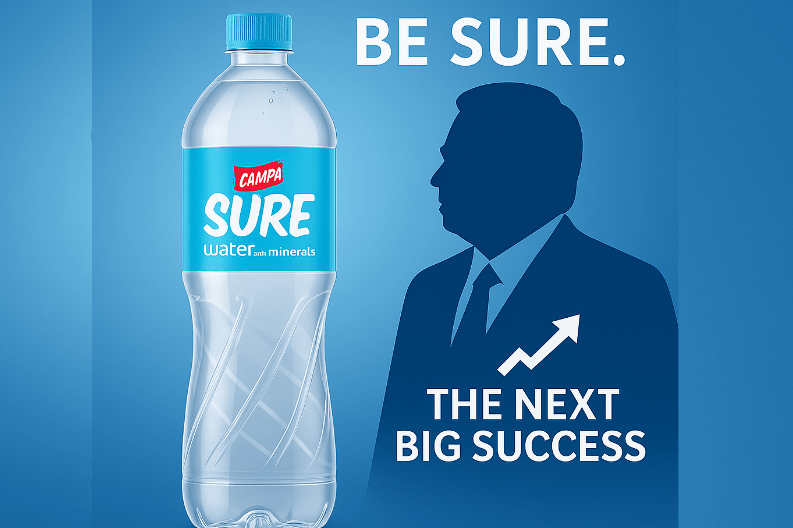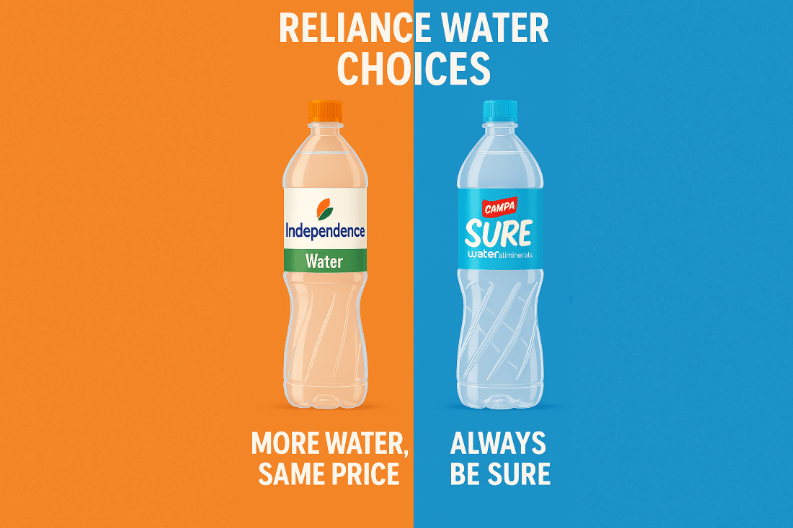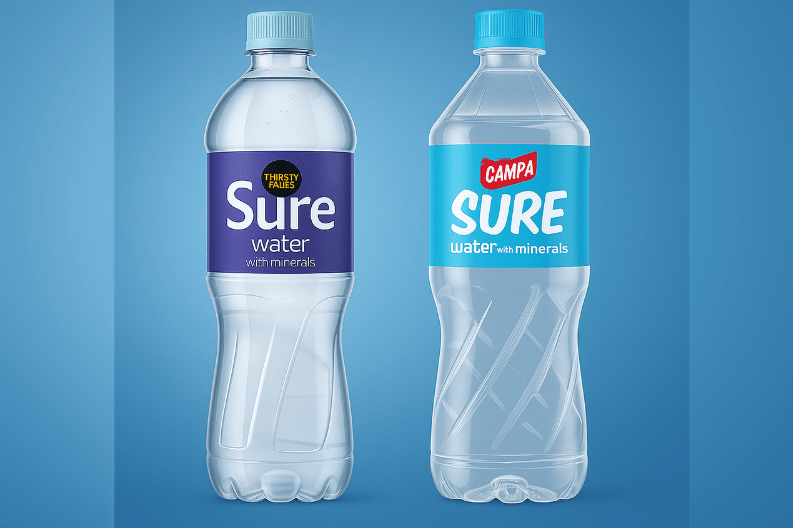Daily News
Reliance Disrupts Bottled Water Market with Campa Sure Water

Reliance Campa Sure Water Bottle is entering the Indian bottled water market with a big disruptive plan. Just like the Jio launch in 2016, this move is designed to offer very low prices first and capture huge numbers of customers. Reliance has proven before that such a model works well. After gaining a strong market base with Jio, the company increased prices, but customers stayed loyal. Now, the same playbook is being applied to packaged water.
Independence Water: Value for Families
- Independence Water is already part of Reliance FMCG.
- Pricing:
|
Quantiy |
Rs (₹) |
|
750 ml |
₹10 |
|
1.5 litre |
₹20 |
- Tagline: “Pure water everyone’s right.”
- Focus: Families and budget-conscious buyers.
- Goal: Offer 50% more water at the same price as competitors.
- Distribution: Semi-urban and rural markets through Reliance Smart and JioMart.
This brand is focused on high volume and low margin. It makes people buy larger packs and feel they are getting maximum value.
Campa Sure Water: Aggressive Urban Push
Reliance Campa Sure Water Bottle is making headlines ahead of its national launch in October 2025. The brand is part of Reliance Consumer Products Limited (RCPL) and is positioned as a direct challenger to well-known bottled water giants like Bisleri, Kinley, and Aquafina. What makes this launch powerful is the aggressive pricing mode
- Campa Sure Water is promoted with the line: “When it comes to water, always be Sure.”
- Pricing:
Quantiy
Rs (₹) 250 ml
₹5
500 ml
₹8
1 litre
₹15
2 litre
₹25
3 litre ₹35
- Purification: 10+ steps of processing to ensure purity.
- Competition: Directly positioned against Bisleri, Kinley (Coca-Cola), and Aquafina (Pepsi).
- Target: Hotels, restaurants, modern retail, and urban consumers.
This premium-disruptive pricing shakes up the market. For example, a 1 litre bottle of Bisleri costs ₹20, but Reliance offers it at ₹15.
Why Two Brands at the Same Time?

Reliance is not dependent on one water product. Instead, it has created a two-tier portfolio:
- Independence Water: A value brand for bulk buyers.
- Campa Sure Water: A branded disruptor for cities and modern stores.
As a result, Reliance dominates both mass market shelves and premium shelves. In addition, it ensures that when a customer enters a kirana or mall, they will likely see multiple Reliance water bottles, thereby reducing space for rivals.
Similar Bottles, Different Labels

Research shows that many bottles of “Sure Water” look almost the same as Reliance’s Campa Sure. For example:
- Thirsty Tales Sure Water (manufactured by SVRE Packaging).
- Listings on JioMart and IndiaMART are selling “Reliance Sure” but showing Thirsty Tales bottles.
The bottle design has identical grooves and shape, yet the labels differ.
This indicates that Reliance and smaller manufacturers may be using the same suppliers or bottle molds. Moreover, it proves that brand confusion is happening because “Sure” is now strongly linked with Reliance. Consequently, sellers sometimes misuse the name “Reliance” to push their stock, even if it is not directly connected.
The Jio Connection
Reliance’s bottled water strategy looks like a replay of its Jio strategy:
- Step 1: Extremely low prices to attract attention.
- Step 2: Expand distribution with Reliance Retail and kirana tie-ups.
- Step 3: Build loyalty through frequent use (daily water need = daily Jio data use).
- Step 4: Later, slowly raise prices once the brand dominates.
This plan worked in telecom, and now Reliance wants to apply it to FMCG and beverages.
Market and Share Impact
- India’s packaged drinking water market: ₹20,000 crore+.
- Growth rate: 13-15% every year.
- Even a 10% market share means thousands of crores in new revenue for Reliance.
- Investors love FMCG because it brings stable, recurring income, unlike oil or gas.
- Reliance’s share value can rise as FMCG becomes a bigger part of the company’s earnings.
Risks Reliance Must Watch
- Price War: Competitors like Bisleri may lower prices.
- Environmental Issues: Plastic bottles attract criticism.
- Execution: Reliance must ensure a smooth supply chain and quality across India.
Even with these risks, Reliance has deep pockets; therefore, it can manage losses until profits arrive later. Moreover, the company has a track record of sustaining aggressive strategies until they succeed.
In conclusion, Reliance is not just selling water; instead, it is creating a new FMCG empire. With Independence Water, it attracts budget families. At the same time, with Campa Sure Water, it challenges top brands in cities. By adopting the Jio-style low-price model, Reliance plans to gradually own this market. If the strategy works, the Reliance Campa Sure Water Bottle could become another story of disruption, loyalty, and market control, just as Jio did in the telecom sector.
Daily News
Enzo Maresca Leaves Chelsea After Manchester City Talks and Breakdown in Relations

Chelsea Football Club parted ways with head coach Enzo Maresca on Thursday, bringing an end to his 18-month tenure at Stamford Bridge. The Italian manager’s departure comes after he informed club officials about holding talks regarding the Manchester City manager position. Moreover, his relationship with Chelsea’s leadership had deteriorated significantly in recent weeks.
Why Did Maresca Leave?
The primary reason for his exit involves a breakdown in relations with Chelsea’s hierarchy. Sources reveal that Maresca told club bosses twice in late October, and again in December, that he had discussed replacing Pep Guardiola at Manchester City. Furthermore, he attempted to use interest from Juventus and City as leverage for a new contract. However, Chelsea rejected this approach and refused to enter negotiations.
Recent Struggles and Tensions
Chelsea’s form had declined significantly before Maresca’s departure. The team won only one of their last seven Premier League games, dropping to fifth place. Additionally, they drew 2-2 with Bournemouth on Tuesday, which led to fans booing the team off the pitch.
| Maresca’s Chelsea Record | Details |
|---|---|
| Time at club | 18 months (July 2024 – January 2026) |
| Trophies won | UEFA Conference League, FIFA Club World Cup |
| Contract length | Until June 2029 |
| Final league position | Fifth place |
| Recent form | 1 win in last 7 games |
Key Issues Behind the Scenes
Several problems contributed to Maresca’s exit:
- Medical Department Clashes: Maresca wanted more freedom to ignore medical advice on player workloads. Chelsea, however, protects players through strict rotation policies to prevent injuries.
- Public Criticism: He made cryptic comments about experiencing his “worst 48 hours” at the club after beating Everton in December. These remarks surprised his own staff members.
- Player Management: The club became concerned when captain Reece James played three full games in one week despite his injury history.
- Fan Reaction: Supporters chanted “You don’t know what you’re doing” when he substituted Cole Palmer against Bournemouth.
Maresca’s Achievements
Despite the turbulent ending, Maresca achieved notable success at Chelsea. He guided the club back to Champions League football by finishing fourth in his debut season. In addition, he won both the Conference League and the inaugural Club World Cup.
What Happens Next?
Chelsea face Manchester City on Sunday without a confirmed manager. Under-21s head coach Calum McFarlane will handle media duties on Friday. Meanwhile, Liam Rosenior, who currently manages Strasbourg (Chelsea’s partner club), emerges as a leading candidate for the permanent position.
The club needs to act quickly as they still compete in four competitions. Consequently, they may appoint an interim manager while searching for a long-term solution.
Enzo Maresca becomes Chelsea’s fifth permanent head coach to leave since Todd Boehly and Clearlake Capital bought the club in May 2022. His departure highlights ongoing instability at Stamford Bridge despite recent trophy success.
Daily News
Alexander Arnold’s Real Madrid Future in Doubt as Premier League Clubs Circle

The football world is buzzing with speculation about Alexander Arnold and his challenging time at Real Madrid. The English defender made a controversial move from Liverpool to the Spanish giants last summer. However, things haven’t gone as planned for the 27-year-old.
Since joining Real Madrid, Alexander-Arnold has struggled to find his rhythm. He has made only 11 appearances across all competitions. Moreover, a quadriceps injury in December has sidelined him for several months. This lack of playing time has raised questions about his future at the Bernabéu.
Current Situation at Real Madrid
Several factors are contributing to the uncertainty:
- Limited game time with just 11 matches played
- Recent injury keeping him out for two months
- Difficulty adapting to Spanish football
- One assist recorded so far this season
Despite these challenges, both Alexander-Arnold and Real Madrid remain committed to each other. The player wants to stay and prove himself. Similarly, the club believes he needs more time to adapt.
Premier League Interest Growing
Nevertheless, three English clubs are monitoring the situation closely. Manchester United, Manchester City, and Newcastle United are all considering making offers. Reports suggest they might bid around €40 million for the defender.
For Manchester United, this move would be particularly controversial. Alexander-Arnold spent his entire career at Liverpool before joining Madrid. A transfer to United would cross one of football’s biggest rivalries.
Meanwhile, Newcastle United sees him as a valuable addition to their squad. They currently sit tenth in the Premier League and want to strengthen their defense.
Real Madrid’s Position
| Club Stance | Details |
|---|---|
| Current valuation | €40 million offers considered insufficient |
| Contract length | Runs until summer 2031 |
| Selling intention | No plans to let him leave |
| Club confidence | Believes in his potential |
Real Madrid paid a small transfer fee to Liverpool last summer. Any sale would generate significant profit for them. However, they have no intention of selling at this point.
What Happens Next?
The January transfer window has opened, but no immediate moves are expected. Instead, the summer of 2026 could be crucial. By then, Alexander Arnold will have had more time to prove himself in Spain. If things don’t improve, those Premier League clubs might return with stronger offers.
For now, everyone waits to see if the talented defender can overcome his struggles and establish himself at Real Madrid.
Daily News
Aaron Hardie Smashes 94 as Perth Scorchers End Hurricanes’ Home Winning Streak

Perth Scorchers delivered a powerful performance at Bellerive Oval, with aaron hardie playing a starring role alongside captain Mitchell Marsh. The duo put on a record-breaking display that ended Hobart Hurricanes’ impressive nine-match winning streak at home. Consequently, the Scorchers moved up to third place on the BBL points table.
Record-Breaking Partnership
Mitchell Marsh scored 102 runs off 58 balls, while Aaron Hardie remained unbeaten on 94 from just 43 deliveries. Together, they created the highest third-wicket partnership in BBL history with 164 runs. Furthermore, their explosive batting powered Perth to a massive total of 229 for 3 wickets.
Match Highlights
| Team | Score | Result |
|---|---|---|
| Perth Scorchers | 3-229 | Won by 40 runs |
| Hobart Hurricanes | 9-189 | Lost |
The turning point came during the final 10 overs. Perth scored an incredible 149 runs in that period. Additionally, they added 38 runs during the Power Surge overs, which completely changed the game’s momentum.
Hardie’s Explosive Performance
Aaron Hardie particularly dominated Chris Jordan in the 12th over. He smashed four boundaries and one six, helping his team collect 26 runs from that over alone. His innings included five massive sixes and showcased his ability to accelerate when needed most.
Mitchell Marsh praised Hardie after the match, saying he deserved the player of the match award. However, Marsh himself received the honor for his century.
Hurricanes’ Chase Falls Short
Despite a strong effort, Hobart Hurricanes couldn’t keep up with the required run rate. They lost opener Mitchell Owen cheaply once again. Subsequently, they lost both openers during the powerplay, putting them under immediate pressure.
Nikhil Chaudhary scored 31 off 15 balls, while captain Matthew Wade added 29 from 14 deliveries. The pair put together a fighting 56-run partnership. Nevertheless, their dismissals in quick succession ended any hopes of a comeback.
Key Factors in Scorchers’ Victory
- Marsh’s second BBL century (102 off 58 balls)
- Hardie’s unbeaten 94 off 43 balls
- Record 164-run partnership for third wicket
- 149 runs scored in final 10 overs
- Disciplined bowling in crucial moments
Impact on Tournament Standings
This victory gave Perth Scorchers their second consecutive big win. Moreover, it boosted their confidence as they secured third position on the table midway through the season. Their record now stands at three wins and two losses.
Meanwhile, Hobart Hurricanes remain second on the points table despite this loss. Their record of four wins and two losses still keeps them in strong contention.
The match proved that aaron hardie has become a crucial player for the Scorchers. His ability to finish innings with such power makes Perth a dangerous team heading into the second half of the tournament.
-

 Entertainment3 years ago
Entertainment3 years agoTop 15 Punjabi Models – Male and Female List
-

 City Guide3 years ago
City Guide3 years ago3B2 Mohali Market Shops: Discover 44 Hidden Gems
-

 Entertainment3 years ago
Entertainment3 years agoTop 11 Punjabi Comedians of All Time
-

 Jobs4 years ago
Jobs4 years agoTop 20 IT Companies in Mohali
-

 Food4 years ago
Food4 years ago11 Best Restaurants in Mohali You Must Visit
-

 Food3 years ago
Food3 years agoTop 15 Cafes in Mohali you must visit
-

 Property2 years ago
Property2 years agoWho Lives In Homeland Mohali: Punjabi Celebrities, Business People…
-

 Education2 years ago
Education2 years ago10 Famous Punjabi Writers With A Great Impact On The Literary World
